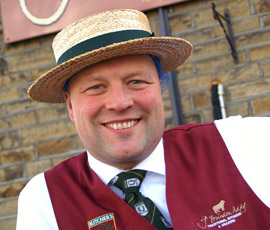Horsemeat scandal boosts trade at local butchers

Family butchers have been enjoying a resurgence in popularity since the horsemeat scandal broke, with some reporting a 40% increase in sales of fresh beef burgers.
Shoppers whose confidence has been dented by supermarkets have been heading back to small family butchers to buy locally sourced meat.
The Butchers Q Guild, a membership of organisation of 110 independent butchers across the UK, said the scare has sent customers back to traditional butchers with increased sales reported from all its members.
Brindon Addy, owner and master butcher of Addy’s Butchers in Hade Edge, West Yorkshire, and chairman of the Butchers Q Guild, has noted a 10% increase in sales since the scandal broke, with a 30% increase in sales of fresh burgers.
“Since the horsemeat scandal hit the news I think consumers have become aware that there isn’t transparency in purchasing meat, in particular, burgers, from their supermarket,” said Mr Addy.
“This isn’t the case with our butchers, who can show the provenance of all the products they sell. We pride ourselves on being able to deliver from farm to plate and knowing each step of that process.”
“We have had many customers come in asking if we have a traceability policy in place. I tell them ‘beef comes from Frank, pigs come from Colin and all the lambs come from my brother Andrew’. It’s a simple policy but it works for us, provenance of our produce is what it’s all about.”
Gordon Atkinson, Elite Meat
Years of supermarkets constantly forcing down prices has meant their suppliers have had to cut corners in quality, added Mr Addy.
“Whenever there is a food scare, like the one we are experiencing now, more people come to us to purchase their meat because they trust us. However, three months later when the media reporting has subsided, many people forget these issues and return to convenience shopping at the supermarket.”
Gordon Atkinson, from Elite Meat butchers in Harrogate, said “We have had many customers come in asking if we have a traceability policy in place.
“I tell them ‘beef comes from Frank, pigs come from Colin and all the lambs come from my brother Andrew’. It’s a simple policy but it works for us, provenance of our produce is what it’s all about.”
Martin Player, from Martin Player High Class Butchers in Cardiff, said: “We can’t believe how many beef burgers are flying off our shelves. More and more customers are coming through the door, even battling the bad weather to get here. In our shop alone we saw an increase in burger sales of 40%.”
Gareth Jones, managing agent of the National Farmers’ Retail and Markets Association, said members were reporting an upsurge in sales of between eight and 10%.
“Every time we get a food scare, people look at where their food is coming from and farm shops and farmers’ markets have that local traceability – you know where you are buying it from and you can see the animals in the field,” he said.
“On balance, the horsemeat scandal should be good news for farmers because the customer will want to buy from trusted sources.”
Roger Kelsey, chief executive of the National Federation of Meat and Food Traders, said: “For the general public, dealing with a local butcher has a hands-on appeal – you know you are buying meat that has been sourced locally.
“It’s just a question of how long this lasts. Once the media loses interest and it is out of the public eye, people tend to revert back to their usual buying trends, although some do continue to buy from butchers.”
The decline of the high street butcher has been swiftly accelerated by challenging economic conditions. There used to be some 22,000 in the mid-1980s, according to Ed Bedington, editor of the Meat Trades Journal. In 2010 there were just 6,553.
Find the positive in horsemeat scandal, says Minette Batters
